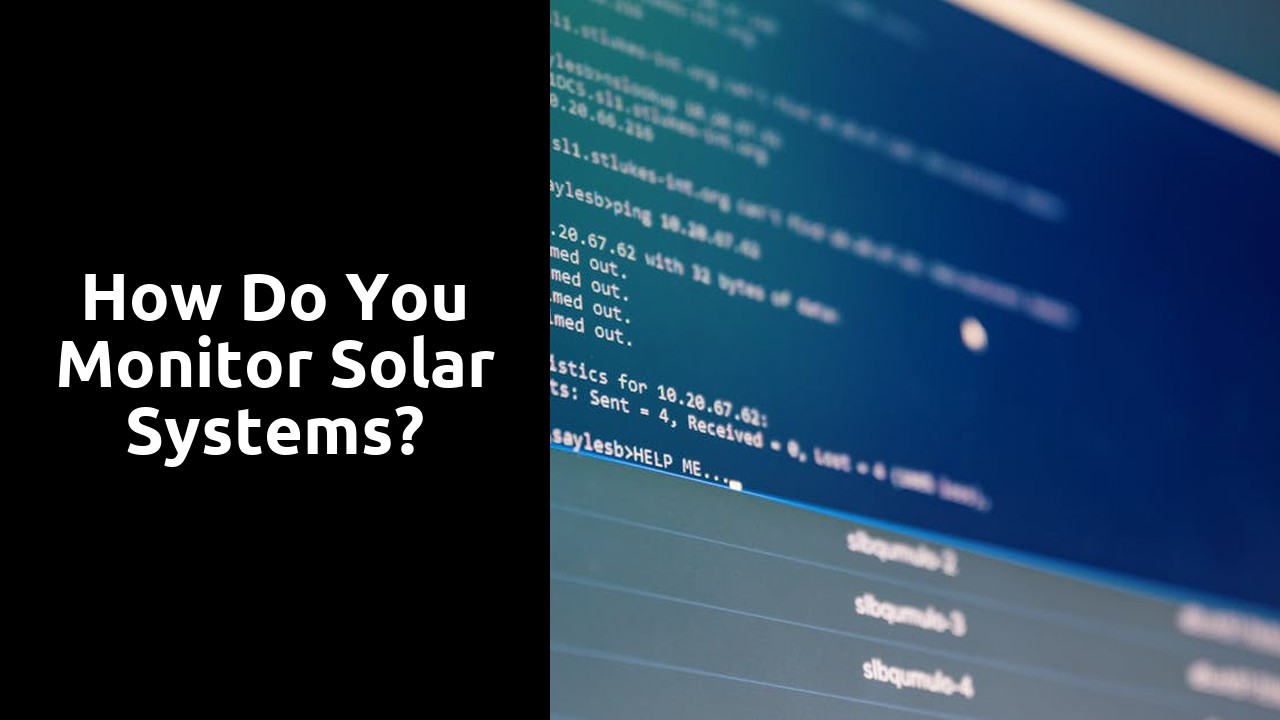
Understanding Solar System Metrics
Understanding Solar System Metrics
When it comes to monitoring solar systems, keeping track of key metrics is essential for ensuring optimal performance over time. Solar Hot Water System Monitoring and Analysis is a crucial aspect of this process, allowing system owners to assess the efficiency and effectiveness of their solar setup. By closely monitoring metrics such as energy production, consumption, and overall system health, individuals can make informed decisions to maintain and enhance their solar systems.
Analyzing the data from Solar Hot Water System Monitoring and Analysis provides valuable insights into the daily energy production levels and potential areas for improvement. By understanding these metrics, system owners can identify patterns, anomalies, or inefficiencies that may arise, enabling them to take proactive measures to address any issues promptly. Utilising this data effectively can lead to increased efficiency and performance of solar systems in the long run, ultimately maximising energy savings and environmental benefits.
Analyzing Daily Energy Production
It is crucial to regularly monitor and analyze the daily energy production of your solar system to ensure optimal efficiency and performance. Solar Hot Water System Monitoring and Analysis can provide valuable insights into how much energy your system is generating each day. By reviewing these metrics, you can identify any issues or irregularities promptly, allowing you to take corrective actions in a timely manner.
Analyzing daily energy production data can help you track the performance of your solar system over time. By comparing daily energy production figures, you can identify trends and patterns that may indicate potential issues with your system. This proactive approach to monitoring can help you maximize the efficiency of your solar system and ensure that it continues to operate at its best.
Preventative Measures for Solar System Monitoring
One crucial aspect of maintaining the optimal performance of solar systems is to regularly conduct preventive measures for system monitoring. By performing routine checks and analyses, issues can be identified early on, preventing potential larger problems down the track. Solar Hot Water System Monitoring and Analysis should be scheduled at specific intervals to ensure that the system is functioning as efficiently as possible.
Another key practice for preventative measures in solar system monitoring is to keep a detailed record of system performance. This includes logging data such as daily energy production, any irregularities or fluctuations, and the effectiveness of maintenance measures taken. By maintaining a comprehensive record, it becomes easier to pinpoint trends or patterns that may indicate underlying issues and take corrective action promptly.
Setting Up Automated Alerts for Irregularities
Automated alerts are essential for promptly detecting irregularities in solar systems. These alerts can notify system owners and maintenance teams of any potential issues in real-time, allowing for quick action to be taken. By setting up automated alerts, such as through email notifications or mobile app alerts, any deviations in energy production or system functionality can be quickly identified and addressed, ensuring optimal performance of the system. Solar Hot Water System Monitoring and Analysis can greatly benefit from these alerts as they provide a proactive approach to system maintenance and troubleshooting, ultimately leading to increased system efficiency and longevity.
Integrating automated alerts into the monitoring system allows for continuous oversight and immediate response to any anomalies that may arise. These alerts can be customised based on specific parameters and thresholds, tailoring the monitoring process to suit the unique characteristics of each solar system. By leveraging technology to proactively manage potential issues, system owners can minimise downtime, reduce repair costs, and maximise the overall performance of their solar systems. Solar Hot Water System Monitoring and Analysis becomes more effective with the implementation of these automated alerts, ensuring that the system operates at its peak efficiency levels.
Enhancing Solar System Efficiency
To boost the efficiency of solar systems, it is crucial to prioritize regular maintenance tasks. Scheduled inspections and upkeep activities can significantly enhance the overall performance of the system. Neglecting these routine tasks can lead to decreased energy production and potential system malfunctions. Thus, implementing a maintenance plan is fundamental for the longevity and efficiency of solar systems.
In addition to maintenance, another key aspect of enhancing solar system efficiency is through solar hot water system monitoring and analysis. By closely monitoring and analyzing the performance metrics of the solar hot water system, adjustments can be made as needed to optimize its efficiency. This proactive approach ensures that the system operates at its peak performance levels, resulting in maximum energy savings and environmental benefits.
Implementing Regular Cleaning Schedules
Implementing regular cleaning schedules is crucial for maintaining the efficiency and performance of solar panels. Dust, dirt, bird droppings, and other debris can accumulate on the surface of the panels over time, reducing their ability to absorb sunlight and generate electricity. Establishing a routine cleaning regimen ensures that these obstructions are promptly removed to allow the panels to operate at their full capacity. Along with improving energy production, regular cleaning also prolongs the lifespan of the solar system components, ultimately saving money on repairs and replacements in the long run.
Solar hot water system monitoring and analysis should include regular inspections to assess the cleanliness of the panels and identify any signs of wear or damage. Depending on the location and environmental conditions, cleaning may be required more frequently in areas prone to dust or pollution. By incorporating cleaning schedules into the overall maintenance plan, solar system owners can maximise their energy output and minimise the risk of malfunctions or inefficiencies. Proper care and attention to detail in cleaning routines are essential for ensuring the continued optimal performance of solar systems.
FAQS
What are some key metrics to monitor in a solar system?
Key metrics to monitor in a solar system include energy production, system efficiency, and any irregularities in performance.
How can I analyze the daily energy production of my solar system?
You can analyze the daily energy production of your solar system by reviewing the data from your monitoring system or inverter to track the amount of energy generated each day.
What preventative measures can be taken for effective solar system monitoring?
To ensure effective solar system monitoring, it is important to set up automated alerts for any irregularities, conduct regular system checks, and implement a maintenance schedule.
How can automated alerts help in monitoring solar systems?
Automated alerts can help in monitoring solar systems by notifying you of any irregularities or issues in real time, allowing for prompt action to be taken to address the problem.
How can I enhance the efficiency of my solar system through monitoring?
You can enhance the efficiency of your solar system through monitoring by implementing regular cleaning schedules, optimizing system performance, and ensuring all components are functioning properly.
